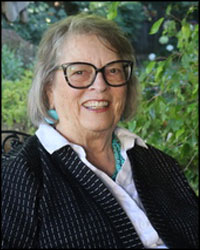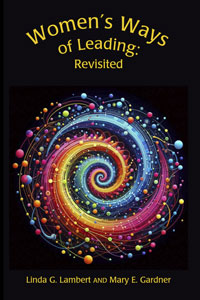Liberating Leadership Capacity
Linda Lambert interviewed by Linda Henke, The Santa Fe Center for Transformational Leadership
Wednesday, March 22nd, 2017
A Discussion with Linda Lambert, Co-author of the New Book Liberating Leadership Capacity: Pathways to Educational Wisdom
By Linda Henke
Linda and I sat on our back deck drinking our favorite beverage, bubbly glasses of prosecco, enjoying the lovely New Mexican sunset, and chatting about her latest endeavor in a long line of powerful leadership books that she has written over the years. Liberating Leadership Capacity, co-written with Diane Zimmerman and Mary Gardner, was something of a surprise to me when Linda mentioned she was returning to leadership writing a year earlier. I thought she had retired from research and non-fiction writing and moved on to creating a rich collection of fiction. I am so glad, however, she chose to return to her familiar haunts, but with some new and even richer perspectives to help us inform our practice. Linda’s work over the years has been seminal to my own leadership thinking and practice, and the ability to dive into her thinking one more time has been exciting.
Henke: You just finished the gargantuan task of writing a fictional trilogy (The Justine Trilogy)…what prompted you to return to writing about educational leadership?
Lambert : When I finished my textbook (Leadership Capacity for Lasting School Improvement), I thought I had written what I had to say. So I turned to fiction. But ten years out, I continued to hear from people all over the world who were basing their work on The Constructivist Leader and the leadership capacity books. I decided to contact many of these people and ask how their learning had advanced over the years. Many had developed rich veins of theory and practice that furthered my thinking and genuinely excited me. I was drawn to further exploration.
I learned a lot by writing fiction—Justine, my protagonist, rides with me as I revisit my mistakes, my meanderings. As she went though her arc of development, I was going through this with her. In many ways the trilogy is a memoir. I was writing the fiction as I was hearing from people about their leadership explorations—it created dissonance. So Justine’s learning, my learning, all of these colleagues’ learning contributed to something of a caldron of new learning for me. When I revisited The Constructivist Leader, I saw it as pivotal to an emerging definition of leadership. The old ideas of leadership were simply out of date with the convergence of new thinking. Things were beginning to change. I traced what was happening in many places: Australia, England, health care in Oklahoma—I saw complexity theory played an essential role in what was happening.
Most of what I have learned in life had little to do with the field of education—it came from other sources—from science, anthropology, archaeology, psychology—all pathways to understanding systems. My journey to The Constructivist Leader then, led me to the Santa Fe Institute in the early 90s. I became enamored with the idea that when things interact something new is created. The notion of the melding of disciplines, the historical place carved out by the information age….these are creating a rich soup that leads to new thinking about leadership. Now, a quarter century later, I came to further understand that evolution. Those understandings culminate in Liberating Leadership Capacity.
Henke: Your books perhaps most especially The Constructivist Leader really shaped many of us as leaders…how has your thinking evolved as you developed Liberating Leadership?
Lambert: The books on leadership capacity sold really well but I didn’t think they created enough fusion between constructivist leadership and capacity building; this is a part what propelled the writing of the new book. The Constructivist Leader definitely opened new ways of thinking. The capacity books were more about intervening—were a more elemental way of seeing the system.
In the end, it’s not just participation—but skills, understanding, world views–these all influence the work–not just who is at the table but how they are at the table.
Henke: In Liberating Leadership Capacity you suggest that a new century of leadership has dawned. What are the critical components of this new paradigm?
Lambert: I believe we are shifting away from the traditional roles of leaders—moving to a much bigger focus on culture, process, and complexity theory. We are increasingly focused on space among and between people, driven by the energy in these spaces. Space and time sensibilities all take on different meanings as we make this shift. Our work in community needs to follow the energy of relationships. Three dynamics need to be in play to start this energy flow:
One has to affect the actual relationships;
One has to affect the content—what the organization is about; and
One has to be about the place.
All three of these must be considered if this energy is to become a force; all three build capacity of the organization.
Henke: So, do you have any advice for leaders out there facing the complex challenges of education today?
Lambert: In the epilogue we write about wisdom. We are self-organizing, self-propelling individuals; and at the same time we are this insignificant blue dot. We are both powerful and insignificant—we westerners have trouble with these two concepts.
So my advice is to stay in conversation. Establish reciprocal relationships. Be patient with chaos. Know that causation is not self-evident, and most answers are multi-faceted. Relinquish punishment for restoration. Venture out rather than pulling in.
And so one of my most important mentors moves my thinking forward again. Linda Lambert’s work reminds us all of Emily Dickenson’s sage advice, “Dwell in possibility.” When I am reading Linda’s work or discussing her rich concept of leadership on the back porch, I do find myself dwelling in possibility.
Posted in Education, Leadership, Leadership Capacity, Liberating Leadership Capacity | No Comments » | Leave a Comment



 Mary Gardner, a retired educator, has dedicated much of her life to learning and leading. She was a teacher, administrator, researcher, and continues to be a writer, mentor and consultant. She and Linda are known for their original work in reframing leadership. Their latest book is Women’s Ways of Leading: Revisited.
Mary Gardner, a retired educator, has dedicated much of her life to learning and leading. She was a teacher, administrator, researcher, and continues to be a writer, mentor and consultant. She and Linda are known for their original work in reframing leadership. Their latest book is Women’s Ways of Leading: Revisited.